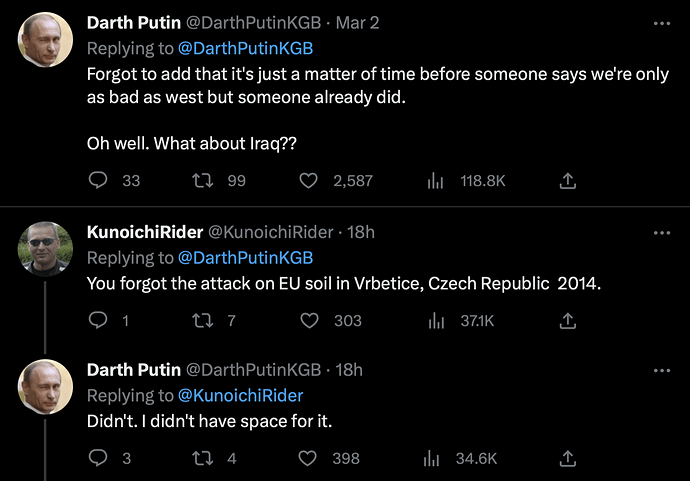Post by goldenvalley on Feb 23, 2023 17:12:06 GMT
Speaking of Wagner Group, the WaPo has an article about the "fighters they "recruited". They interviewed some who were in Ukrainian custody. (The link is to the gift so you can read the whole thing)
He was less than two years into his nine-year sentence last October when inmates known as “goats,” who cooperate with the guards, ushered dozens of convicts into the prison yard of Penal Colony No. 7 in time to see a helicopter descending on the grounds.
Yevgeniy Prigozhin, the founder of the Wagner Group, emerged and came to address the assembled crowd. It was shortly after Ukrainian’s autumn counteroffensives had pushed Russian forces from much of Kharkiv and Kherson regions, and the Kremlin was desperate for new fighters.
Prigozhin told the prisoners that he came with President Vladimir Putin’s offer to “wipe the slate clean” of criminal convictions for anyone signing up to fight.
Mikhail also heard Prigozhin promise that anyone who ran away from the front would immediately “go to zero,” the Wagner term for assassinating its own men. Within 10 days, he was on a flight to western Russia, far from his wife and four children in the East, and by November he was in occupied eastern Ukraine.
Ilya arrived in Ukraine a month later, after other Wagner recruiters came to his prison. In addition to erasing his conviction, he expected to be paid more than $1,300 a month as an infantry man, and up to $1,200 more in bonuses for taking out an enemy position or blowing up a vehicle.
Before taking up his Kalashnikov assault rifle, Ilya went through a short stint of infantry training in a stretch of occupied Ukrainian forest with Wagner professionals who had fought in Syria and Africa. Neither he nor Mikhail saw any sign of regular Russian military units in their time fighting with Wagner.
Ilya was one of the fighters responsible for locating Ukrainian troops. But with one drone for his entire unit and no other targeting gear, his only option was to advance under fire until he sighted the enemy with his own eyes. Most days were a slaughter, he said.
On one occasion, more than 400 of his fellow fighters were killed over 72 hours while trying to storm the village of Krasna Hora, he said, with many of the corpses left lying in the snow. Ilya said he ran past several dead men that he recognized.
When some fighters complained, punishment was swift. One of Ilya’s friends from the Smolensk prison, a 24-year-old known by the nickname Kozan, was one of 10 fighters pulled aside after joining in a riot over conditions.
“The written contract could not be violated,” said Ilya, who said he was shown videos of Wagner officers hanging alleged defectors from balconies, breaking their hands or battering them to death. There have been numerous videos, consistent with his description, posted on social media.
“I had thoughts of running away, but they have information about my family, my children,” he said.
Yevgeniy Prigozhin, the founder of the Wagner Group, emerged and came to address the assembled crowd. It was shortly after Ukrainian’s autumn counteroffensives had pushed Russian forces from much of Kharkiv and Kherson regions, and the Kremlin was desperate for new fighters.
Prigozhin told the prisoners that he came with President Vladimir Putin’s offer to “wipe the slate clean” of criminal convictions for anyone signing up to fight.
Mikhail also heard Prigozhin promise that anyone who ran away from the front would immediately “go to zero,” the Wagner term for assassinating its own men. Within 10 days, he was on a flight to western Russia, far from his wife and four children in the East, and by November he was in occupied eastern Ukraine.
Ilya arrived in Ukraine a month later, after other Wagner recruiters came to his prison. In addition to erasing his conviction, he expected to be paid more than $1,300 a month as an infantry man, and up to $1,200 more in bonuses for taking out an enemy position or blowing up a vehicle.
Before taking up his Kalashnikov assault rifle, Ilya went through a short stint of infantry training in a stretch of occupied Ukrainian forest with Wagner professionals who had fought in Syria and Africa. Neither he nor Mikhail saw any sign of regular Russian military units in their time fighting with Wagner.
Ilya was one of the fighters responsible for locating Ukrainian troops. But with one drone for his entire unit and no other targeting gear, his only option was to advance under fire until he sighted the enemy with his own eyes. Most days were a slaughter, he said.
On one occasion, more than 400 of his fellow fighters were killed over 72 hours while trying to storm the village of Krasna Hora, he said, with many of the corpses left lying in the snow. Ilya said he ran past several dead men that he recognized.
When some fighters complained, punishment was swift. One of Ilya’s friends from the Smolensk prison, a 24-year-old known by the nickname Kozan, was one of 10 fighters pulled aside after joining in a riot over conditions.
“The written contract could not be violated,” said Ilya, who said he was shown videos of Wagner officers hanging alleged defectors from balconies, breaking their hands or battering them to death. There have been numerous videos, consistent with his description, posted on social media.
“I had thoughts of running away, but they have information about my family, my children,” he said.




